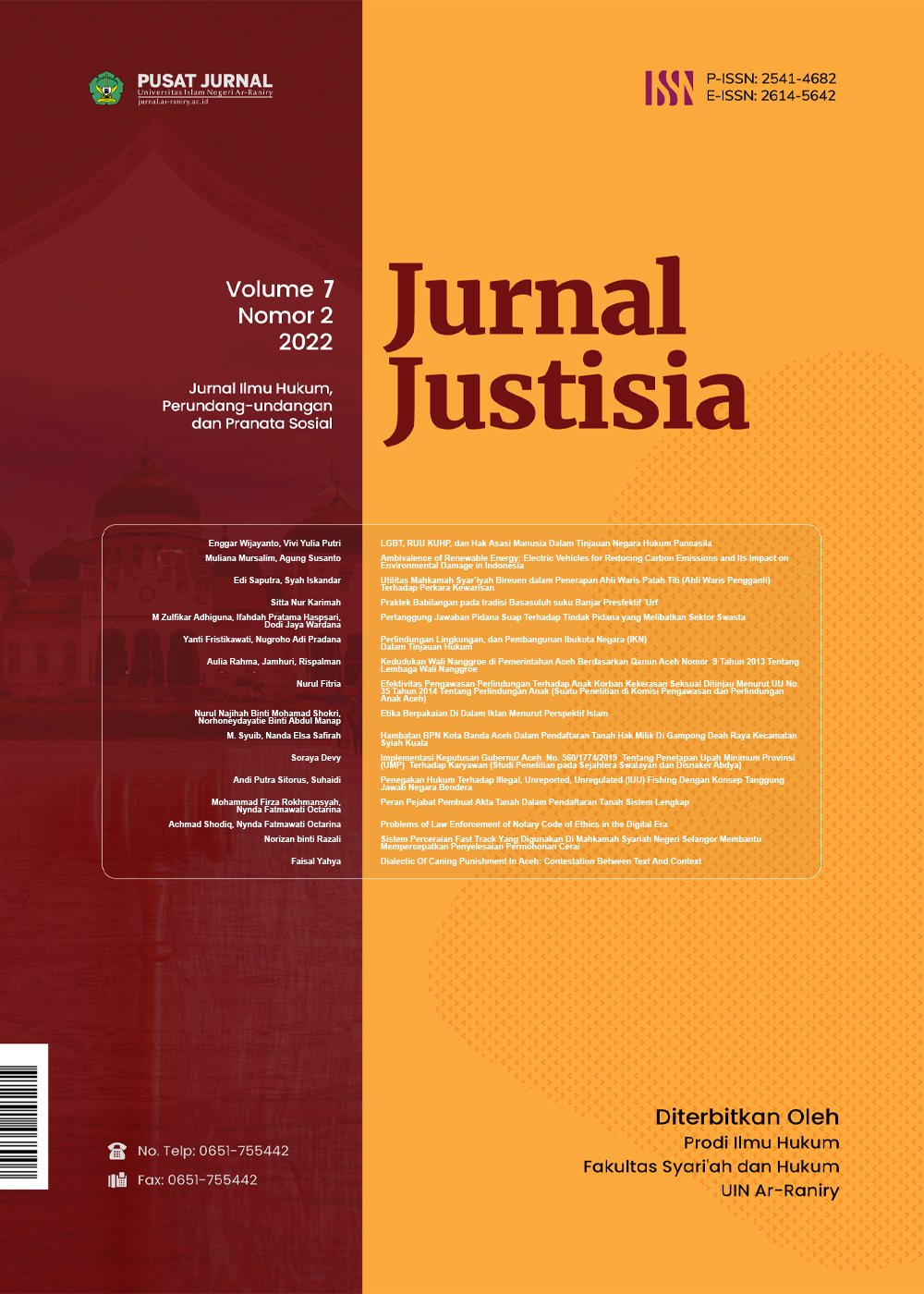Kedudukan Wali Nanggroe di Pemerintahan Aceh Berdasarkan Qanun Aceh Nomor 9 Tahun 2013 Tentang Lembaga Wali Nanggroe
DOI:
https://doi.org/10.22373/justisia.v7i2.15607Abstract
Abstrack
Lembaga Wali Nanggroe was formed with its function as a unifying forum for Aceh people. Undang-undang Pemerintah Aceh No 11 Tahun 2006 explains the existence to acknowledge this institution. Lembaga Wali Nanggroe is a non-governmental institution which means it is neither an executive nor a legislative body. The authority stated in Undang Undang No 10 Tahun 2019 also includes executive and legislative branches so that the position of Lembaga Wali Nanggroe in the Aceh government is questionable. This study uses legal research methods. The position of the Wali Nanggroe in Indonesian government is limited to a costumary issues, Lembaga Wali Nanggroe is not allowed to take care of non customary issues such as politics. The authority of the Wali Nanggroe in the Aceh governance system is a customary institution that takes care of all Acehnese customary and specific interests, including providing input to the Aceh government because state life ini Aceh is inseparable from customary issues, including land, mining, accelerating development and related matters with the community that included in adat so Lembaga Wali Nanggroe takes care of the problem as parts of its authority.
Keywords : Position, Lembaga Wali Nanggroe, Authority
Abstrak
Lembaga Wali Nanggroe dibentuk dengan fungsinya sebagai wadah pemersatu masyarakat Aceh. Untuk mengakui keberadaan lembaga wali nanggore ini maka Undang- undang Pemerintah Aceh No 11 Tahun 2006 menjelaskan keberadaan lembaga ini. Lembaga Wali Nanggroe merupakan lembaga non pemerintahan yang berarti bukan lembaga eksekutif maupun legislatif. Tapi kewenangannya yang disebutkan dalam UU No.10 Tahun 2019 juga mencakup kewenangan pihak eksekutif dan legislatif, sehingga sehingga yang menjadi rumusan masalah adalah bagaimana kedudukan lembaga wali nanggroe di pemerintahan Aceh? Penelitian ini menggunakan metode penelitian hukum normative. Kedudukan Wali Nanggroe dalam pemerintahan Indonesia hanya sebatas lembaga adat yang mengurus permasalahan adat istiadat sehingga lembaga wali nanggroe tidak dibenarkan mengurus selain yang bukan masalah adat seperti politik. Kewenangan Wali Nanggroe dalam sistem pemerintahan Aceh adalah lembaga adat yang mengurus segala kepentingan adat dan kekhususan Aceh, termasuk memberi masukan kepada pemerintah Aceh karena kehidupan bernegara di Aceh tidak terlepas dari permasalahan adat, termasuk pertanahan, pertambangan, dan percepatan pembangunan dan hal-hal yang berhubungan dengan masyarakat, itu dimasukkan dalam adat sehingga lembaga wali nanggroe mengurus permasalahan itu sebagai suatu kewenangannya.
Kata kunci: Kedudukan, Lembaga Wali Nanggoe, Kewenangan.
Downloads
Published
Issue
Section
License
The Authors submitting a manuscript do so on the understanding that if accepted for publication, copyright of the article shall be assigned to Jurnal Justisia : Jurnal Ilmu Hukum, Perundang-undangan dan Pranata Sosial, Ar-Raniry State Islamic University, Indonesia as the publisher of the journal.
Jurnal Justisia : Jurnal Ilmu Hukum, Perundang-undangan dan Pranata Sosial right of first publication with the work simultaneously licensed under Creative Commons Attribution-ShareAlike 4.0 International License (CC BY-SA 4.0) that allows others to share (copy and redistribute the material in any medium or format) and adapt (remix, transform, and build upon the material) the work for any purpose, even commercially with an acknowledgment of the work's authorship and initial publication in Jurnal Justisia : Jurnal Ilmu Hukum, Perundang-undangan dan Pranata Sosial. Authors are able to enter into separate, additional contractual arrangements for the non-exclusive distribution of the journal's published version of the work (e.g., post it to an institutional repository or publish it in a book), with an acknowledgment of its initial publication in Jurnal Justisia : Jurnal Ilmu Hukum, Perundang-undangan dan Pranata Sosial. Authors are permitted and encouraged to post their work online (e.g., in institutional repositories or on their website) prior to and during the submission process, as it can lead to productive exchanges, as well as earlier and greater citation of published work (See The Effect of Open Access).

